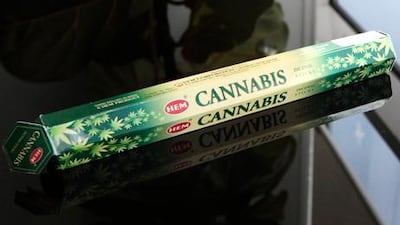DUBAI // A brand of incense designed to smell like cannabis is being sold in supermarkets.
The 'hand-rolled' incense, marketed simply as Cannabis, has been sold in Dubai for several years and its owners say they haven't run into any legal problems.
But psychologists say that teenagers looking to experiment with drugs could try to crush up the incense in a misguided attempt to get high.
"It's messing with children's minds," said Charmaine Van Zyl, a psychologist at the Canadian Medical Centre. "Teenagers like to experiment and want to try new things. That kind of name can be a trigger for them.
"In other countries, because drugs are accessible and they can get hold of it, you only get a minority who go out and do it. But in some respects here you get more who are interested because it's forbidden and intriguing.
"I think if they see the name of that stuff, it will spread like wildfire around schools."
The incense is manufactured by a brand called Hem Corporation, which alongside other traditional scents like lavendar and ylang ylang also produces another type of incense called 'opium'.
"Our cannabis incense sticks are in no way connected to real cannabis and do not contain any ingredient of cannabis," said general manager Kartik Momaya.
"It's just a name that's given, because it smells like that. It's just a synthetic perfume and nothing harmful."
Mr Momaya said the incense has been sold in the UAE for more than 10 years. "It's very popular, we are the number one in this product category."
Dr Sarhan Al Meheini, deputy director of the Police Sciences Academy in Sharjah said it was questionable how the incense could smell like cannabis without having any ingredients of the drug.
"Someone from the police should check up on whether it does contain some kind of cannabis," he said. "If it does not contain cannabis and is not breaking any law then I see nothing wrong with it."
However, Johanna Griffin, an addiction specialist at LifeWorks counseling said children were known to try to abuse common household products found at shops.
The trend of inhaling butane, known as 'huffing', was linked to the death of 17-year-old British student Anton Tahmasian in 2010.
"Teenagers are at that age where they want to experiment," said Ms Griffin. "Particularly here, where they don't have access to conventional drugs, they want to try new things out."
The incense packaging does not contain a list of ingredients. Ms Griffin said that the incense should be clearly labelled as not containing cannabis, so as not to encourage children.
Another psychologist, Dr Raymond Hamden, from the Human Relations Institute, said the fact no disclaimer was on the packaging meant that it could be a powerful placebo.
He said several studies have shown that a placebo substance, which smelt like cannabis when burned, was linked with feelings of intoxication in test subjects.
"If the research applies in this case, then people can get high just off what they think is going to happen," he said.
"The psychologically vulnerable are going to get addicted, just through the psychological effects," he said. "It doesn't always have to be from the physiological effects."
mcroucher@thenational.ae

